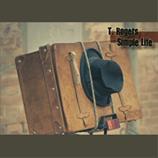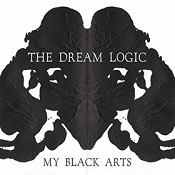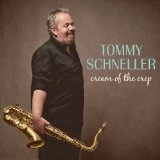 It’s only a couple of years ago that Henrik Freischlader announced his retirement, going out with an album and a farewell tour in 2014. Since then he’s concentrated on production duties for his Cable Car Records label, releasing albums by Tommy Schneller and Layla Zoe. The good news for guitar fans is that he’s back, with the new album “Openness” and a tour to support the album. He’s back to working in the power trio format with Carl-Michael Grabinger (drums) and Alex Grube (bass) and sounding as good as ever. There are some clues in the lyrics as to the reasons for the sabbatical but, hey, it’s good to have him back; there aren’t many players who can boast his technique, power and soul.
It’s only a couple of years ago that Henrik Freischlader announced his retirement, going out with an album and a farewell tour in 2014. Since then he’s concentrated on production duties for his Cable Car Records label, releasing albums by Tommy Schneller and Layla Zoe. The good news for guitar fans is that he’s back, with the new album “Openness” and a tour to support the album. He’s back to working in the power trio format with Carl-Michael Grabinger (drums) and Alex Grube (bass) and sounding as good as ever. There are some clues in the lyrics as to the reasons for the sabbatical but, hey, it’s good to have him back; there aren’t many players who can boast his technique, power and soul.
The album’s opening song, “Openness”, sets the scene perfectly with a huge funky riff, a rasping blues vocal and a lyric about escaping from the past (he’s ‘overdue to be back on track’) and a squalling solo beginning and ending with waves of feedback. There’s a downshift for the second song, “Early Morning Blues”, which shuffles along through some interesting chord runs with a languorous vocal and a clean jazz tone for the solo. You know you’re in the presence of a master, and there’s confirmation when the ‘dust my broom’ reference heralds a blistering slide solo in “Lord Have Mercy” and in the chugging, overdriven riff of “Business Straight”, leading up to a wah wah solo that builds through slow chord runs to single notes flying out in squalls and flurries.
The album’s next three songs develop the lyrical themes of rebirth, redemption and responsibility that permeate the album, particularly the jazzy “Master Plan” with its unpredictable solo and rhythmic switch and walking bass towards the end of the song. The slow ballad “Never Really Left You” demonstrates Henrik’s powerful soul voice and could be addressed to a lover or the audience he gave up for a short time, while the riff-driven “Nobody Else to Blame” talks about ‘falling in love with me’.
“Techno” is a plea to bring back more of the raw edges and imperfections to life, driven along by a massive riff and emphasising the rawness with a clanging, atonal solo and “High Expectations” is a power trio blues about the difficulty of living with a professional musician, while the funky “Today I’m Gonna Change” channels the great Albert Collins with jazzy chords and a cleanly-picked solo. The two slower songs towards the end of the album, “Senses” and the resonator-backed “His Love” suggest that Henrik’s found a meaning or a purpose, whether it’s a god or something else to believe in and give meaning to his life.
Whatever he’s found, it’s working really well for him. “Openness” shows all of Henrik’s versatility as a guitar player, singer and songwriter. Welcome back; we’ve missed you.
“Openness” is out now on Cable Car Records (CCR 0311-47).
 So, where are the likely places to hear someone playing a Telecaster? On a British nineties indie record maybe; the black Tele was the indie guitar-slinger’s weapon of choice. On a country record maybe; James Burton has a couple of signature models. Springsteen? Albert ‘master of the Telecaster’ Collins? How about on a Europop or techno/folk album (whichever description you prefer) by a French artist writing in English and inspired by Tim Burton and David Lynch? No, wouldn’t have been my first choice either, but that’s exactly where we find this particular Telecaster doing its thing.
So, where are the likely places to hear someone playing a Telecaster? On a British nineties indie record maybe; the black Tele was the indie guitar-slinger’s weapon of choice. On a country record maybe; James Burton has a couple of signature models. Springsteen? Albert ‘master of the Telecaster’ Collins? How about on a Europop or techno/folk album (whichever description you prefer) by a French artist writing in English and inspired by Tim Burton and David Lynch? No, wouldn’t have been my first choice either, but that’s exactly where we find this particular Telecaster doing its thing.
But this is about more than Telecasters. Talisco is based in Paris, he’s already well-known across mainland Europe (“Run” was released in France in 2014) and this is the push to crack the UK market. He’s only started singing relatively recently (if my translation of his French Wikipedia page is accurate) and that’s a huge surprise, because his voice is powerful and distinctive with a strong resemblance to Freddie Mercury on the first two Queen albums.
A couple of songs on the album, the opener “Your Wish” and “The Keys” might even sound a bit familiar because they’ve been used to soundtrack ad campaigns in the US and Europe. They’re both a bit lively and, along with “In Love” which separates them on the album, not too representative of the work as a whole.
“Follow Me” has a very sixties, clean and heavy on the reverb, guitar sound while “Sorrow”, with its damped guitar riff hints at the dynamics of Link Wray’s “Rumble”. The early Queen references shine through on the multi-tracked vocals of the acoustic “So Old” and the piano and acoustic guitar arrangement of the album’s closer “Lovely”. The clean Telecaster intro of “Glory” has more than a hint of Mink de Ville’s “Spanish Stroll” and the intro and riff from “Everyone” is pure Ennio Morricone.
“Run” is an album packed with ideas and invention, striding effortlessly across musical styles from various eras with verve and panache. And Talisco does have a great voice. For my money, some of the more uptempo songs opening the album are a bit overdone, and overall it lacks a bit of focus, but it’s certainly an interesting listen and a pretty good hint that there’s much more to come.
“Run” is out in the UK on April 8th on Roy Music (ROY 60).
 We’re continuing our European journey into 2015 with a blues band from Hungary who write and sing in English and take their inspiration from the legendary Keb’ Mo’, who also makes a guest appearance on one song. The album, “Simple Life”, is the fourth from T Rogers, following “Driven by the Blues”, “Wear your Soul”, and the live album “Live from Home”. The band has been together for about ten years with a core of Bélá Baráth (drums), Ferci Kovács (vocals, guitars), Pál Sturmann (guitars), Zsolt Szatai (bass), Vince Széil (percussion) joined in 2010 by Canadian Stew Hay (harmonica). The album has been available for almost two years, but the lovely people at Cable Car Records have sent me a copy, so it would be rude not to tell you about it.
We’re continuing our European journey into 2015 with a blues band from Hungary who write and sing in English and take their inspiration from the legendary Keb’ Mo’, who also makes a guest appearance on one song. The album, “Simple Life”, is the fourth from T Rogers, following “Driven by the Blues”, “Wear your Soul”, and the live album “Live from Home”. The band has been together for about ten years with a core of Bélá Baráth (drums), Ferci Kovács (vocals, guitars), Pál Sturmann (guitars), Zsolt Szatai (bass), Vince Széil (percussion) joined in 2010 by Canadian Stew Hay (harmonica). The album has been available for almost two years, but the lovely people at Cable Car Records have sent me a copy, so it would be rude not to tell you about it.
The first three tracks, “Far and Slow”, “Weary Road” and “Gotta Go” kick things off reasonably well with nice harmonica and guitar solos; “Gotta Go” taking its inspiration from “Sweet Home Chicago” and ”Dust My Broom” and featuring solos with some of the cleanest picking this side of Albert Collins. But it’s only after this opening trio that things start to get really interesting.
“Angelina”, a Keb’ Mo’ cover, featuring vocals and acoustic slide from the man himself, seems to bring out the best in the entire band, from the stuttering acoustic intro to Stew Hay’s manic harmonica solo. While “Weary Road” shows hints of something other than blues, “Something Human” moves into rock territory with a hint of that uncertain late sixties/early seventies era when blues, via the power trios and The Yardbirds, was morphing into rock. The uptempo shuffle of “The Regular’s Blues” is more of the harmonica and ice pickin’ interplay with one of the most clean, laid-back blues solos you’re ever likely to hear, leading into a noisy guitar/harmonica duet.
“Sun on my Back” and “Mood for the Day” are both acoustic, country blues, but that’s where the similarity ends; “Sun on my Back” is a rattling upbeat, uptempo piece with harmonica and acoustic guitar solos but “Mood for the Day” is much slower and builds layer by layer from an acoustic and tambourine intro to a full band and massed chorus finale. There’s even a trucker’s gear change coming into the acoustic solo; what more do you want?
“It Hurts me Too” is a fairly straightforward Elmore James cover, and “Sunshine Cold” opens with a funky guitar riff and verse before moving into a straight rock chorus and then we close with the title track of the album. “Simple Life” is the album’s ‘message song’ and the message is a very clear ‘let’s get back to basics with our lives’. The song ebbs and flows using volume dynamics, acoustic and electric instrumentation and tempo changes to keep the interest level high and is the perfect choice to close out the album.
If you’re a blues/rock or blues fan, there’s definitely something here for you; it’s mainly influenced by traditional country and Chicago blues, bypassing the sixties and seventies interpretations and it’s played with a lot of skill and a fair amount of style. I’m guessing that this would be a great band to see live.
“Simple Life” is out now and is self-released.
 So, here’s an interesting one; “My Black Arts” is the second album from The Dream Logic. The core of the band is singer and guitarist Charles Compo, bass player Jerry Brooks and drummer Camille Gainer but the album also features cameos from guitarists Eric Krasno (Soulive) and Vernon Reid (Living Colour). As far as trying to pin a genre on the band, I’m sticking to guitar-based at the moment.
So, here’s an interesting one; “My Black Arts” is the second album from The Dream Logic. The core of the band is singer and guitarist Charles Compo, bass player Jerry Brooks and drummer Camille Gainer but the album also features cameos from guitarists Eric Krasno (Soulive) and Vernon Reid (Living Colour). As far as trying to pin a genre on the band, I’m sticking to guitar-based at the moment.
The first track, “My Red Heart”, opens with some guitar and percussion noodling before dropping into a groove that echoes “Gaucho”-era Steely Dan (right down to a sprinkling of atonality in the guitar solo) with clean guitars and keys under Charles Compo’s very distinctive vocal, which has more than a hint of Sweet Pea Atkinson (more about that later). From here on in, the band takes on a variety of different disguises, as it tackles a range of musical styles.
“Cisco Kid” and “When I Go” have a bluesy feel, the first funky, and the second a slow blues with very clean picking in the style of Albert Collins before a coda which shifts to mid-tempo before a paint-stripping guitar solo. Drums and bass are fairly funky throughout and the songs “”Just Can’t Quit It”, “The Way That I Want It” and “Think I’ll Stay” stick fairly closely to a funk template.
“It’s Murder”, with its driving bassline, “I Hope It’s Real”, with a catchy guitar hook and guitar fills in the verses, the Southern swamp boogie of the single “Drunken Monkey” and the all-out driving tempo of “Headlights Into the Darkness” (with a hint of pastiche in the backing vocals) all help to establish the band’s rock credentials while “Don’t Judge” has slow 70s style soul arrangement with nice laid-back, almost jazz, guitar.
The remaining three tracks are the seasoning which gives the album its unique flavour. “Biznasty” (with a lyric about a music business sleazeball) is propelled along by Stones-style intertwined guitar parts with an added sitar to give the song its individual style. And then things get weird. “Trying to be a Buddha”, a slow piece which evokes 80s-era Prince meeting Tom Verlaine is almost a mantra, while the closing (and title) track, “My Black Arts” is a loose jam which perhaps made a lot more sense in the studio than it does here.
On the positive side, the playing is superb throughout, particularly when the arrangement is for two guitars. There’s a lot of variation; it’s never boring because you just don’t know what’s coming next and the band sounds fairly convincing across all of the genres they tackle. The negatives are that there’s probably too much material here (14 songs) and the title track, “My Black Arts”, comes over as a bit self-indulgent and aimed at the band rather than the listener. The band is obviously influenced by a tremendous variety of styles and the finished product here feels mostly like Steely Dan interpreted by Don and David Was (who also had a penchant for including half-finished jams and other bits of weirdness on their albums) with hints of many other styles. It’s not a bad album at all; it’s a good album which might have been even better with a tighter focus.
 You have to wonder how Henrik Freischlader spends his spare time, or if he actually has any. Over the last twelve months, he’s released two self-produced studio albums, a four-CD live set and he’s produced albums for singer-songwriter Layla Zoe (“The Lily”) and now this album from saxophonist and singer Tommy Schneller. He also plays guitar drums and bass on “The Lily” and “Cream of the Crop” while providing the music for Tommy Schneller’s lyrics. He’s done a few tours in support of his own albums as well.
You have to wonder how Henrik Freischlader spends his spare time, or if he actually has any. Over the last twelve months, he’s released two self-produced studio albums, a four-CD live set and he’s produced albums for singer-songwriter Layla Zoe (“The Lily”) and now this album from saxophonist and singer Tommy Schneller. He also plays guitar drums and bass on “The Lily” and “Cream of the Crop” while providing the music for Tommy Schneller’s lyrics. He’s done a few tours in support of his own albums as well.
Tommy Schneller’s “Cream of the Crop” is a few steps away from Henrik’s own blues/rock material, with a much greater emphasis on influences from the early rock and pre-rock years in the playing and the arrangements, particularly the use of the three-piece horn section. This album feels a little like a Tommy Schneller showcase, demonstrating his instrumental ability as well as a gruff blues voice, both of which work well across the wide range of styles on display. The album is built around some superb arrangements (particularly for the horns) which sound authentic in each of the styles tackled. Henrik Freischlader’s guitar, bass and drums are augmented by Gregory Barrett (organ), Gary Winters (trumpet), Dieter Kuhlmann (trombone) and a cameo appearance by Moritz Fuhrhop (organ) on the opening track.
The album opens and closes with the straightforward slow blues songs, “Hands in the Air” and “You Don’t Seem to Care” which feature the quality of blues playing we’ve come to expect from Henrik. “She’s So Good to Me” and “Super Hero” are both big seventies-style tunes with classic horn arrangements by Gary Winters which wouldn’t sound out of place on any of the early Southside Johnny albums. Sandwiched between these songs is the title track, a swing pastiche with bragging lyrics which don’t really belong in the twenty-first century. “Ain’t No Maybe” and “What Did I Do” push the funk buttons quite effectively but there are three remaining songs which all stand out for different reasons. “Isn’t it New” is a great pop song complete with a perfect sing-along chorus, while the minor key “Your Somebody Else” (and that’s not a punctuation error on my part or Tommy Schneller’s) features some wonderful guitar lines in the style of Albert Collins and a breathy sax solo from Tommy. “Higher and Higher” has a funky, almost seventies disco, feel and a completely mad instrumental section with the horns having great fun ripping through several stlyes and a trucker’s gear change before leading back in to the verse.
There are some great moments on this album and I certainly want see the band live on the strength of this; the musicianship is flawless and it feels like the musicians are having fun. There are a few great moments but I think the album would be better if Tommy Schneller was looking forward rather than back and if the band were doing what they want to do rather than showing what they can do. If you like your songs served up with Hammond and horns, this is definitely worth a listen.
Out now on Cable Car Records (CCR 0311-43).
 If you only ever listen to chart radio (and maybe watch “Later” every week) then the chances are that you won’t have heard of Paul Rose. I can’t imagine that you would hear him on 6 Music either. You might just get lucky with Paul Jones on Radio 2 on the right night. Paul Rose, like many other incredibly gifted players here and in the US, is a blues/rock guitarist and, from a commercial point of view, that’s a really difficult place to be at the moment. There’s a small but knowledgeable and enthusiastic live circuit in the UK and mainland Europe, but almost no chance of mainstream radio exposure or shelf space in the few remaining record shops. You have to admire the commitment of the musicians who carry on playing that circuit and releasing albums; they aren’t doing it for the Ferrari.
If you only ever listen to chart radio (and maybe watch “Later” every week) then the chances are that you won’t have heard of Paul Rose. I can’t imagine that you would hear him on 6 Music either. You might just get lucky with Paul Jones on Radio 2 on the right night. Paul Rose, like many other incredibly gifted players here and in the US, is a blues/rock guitarist and, from a commercial point of view, that’s a really difficult place to be at the moment. There’s a small but knowledgeable and enthusiastic live circuit in the UK and mainland Europe, but almost no chance of mainstream radio exposure or shelf space in the few remaining record shops. You have to admire the commitment of the musicians who carry on playing that circuit and releasing albums; they aren’t doing it for the Ferrari.
Paul Rose has released 11 albums before “Double Life” and has built up a reputation as a powerful live performer whose style is basically blues/rock with elements of jazz and soul and maybe a hint of country; this album shows hints of all of those styles. What’s certain to me is that he’s a guitar virtuoso and that always brings its own little set of problems, which I’ll get to a bit later. The album is a set of blues/jazz standards performed almost live in the studio over 15 days by a group of incredibly talented and experienced musicians including Randy Jacobs (rhythm guitar), Richie Morales (drums), Kenny Hutchison (bass) and Tio Banks (keyboards). The singers featured are Terry Evans, Raffia Ford, Bernard Fowler and Sweet Pea Atkinson. Now I’m not doing all the work for you here, but Bernard Fowler has been the Stones backing vocalist for as long as I can remember and Sweet Pea Atkinson was the singer with my favourite incarnation of Was (Not Was).
So, how does it sound? It sounds great actually; the band work together well through the variety of styles on the album from the riff-based rockers “Cold Sweat” and “Honey Hush” which open the album through the mid-tempo, soulful “Let’s Straighten it Out” and “Drowning in a Sea of Love” (with a bit of a Robert Cray feel), the soul ballad “If Loving You is Wrong I Don’t Want to be Right” to the slow blues of “Stormy Monday” which closes the album. There are plenty of reference points and influences; “If Loving You is Wrong…” has a Stones feel with the intertwined guitar intro, while “Just a Little Bit” reminds me of the Albert Collins song “Conversation with Collins”.
Most of the songs here have been covered so many times that you shouldn’t expect to hear any truly novel interpretations, but that isn’t the aim of the album. It’s about a group of musicians playing songs they know and love, having fun and producing a record that’s great to listen to while showcasing the musicians at their best. And that leads us on to my only little criticism.
When you can play as well as Paul Rose (and I did use the word virtuoso earlier), it’s easy to miss the line between great playing in the service of the song and technique for the sake of technique. On “Stormy Monday”, the slow blues style lends itself to guitar fills at the end of each of vocal line, which works really well for most of the song but, for me, becomes a bit intrusive at times, particularly when Paul uses violinning. As always, this is completely subjective and I’m prepared to be shot down in flames if loads of you contact us and say I’m talking out of my elbow.
With that very minor exception, I think this is a very, very good album. The quality of the playing is exceptional throughout, the arrangements are superb and each of the singers is perfect for the songs they do. If you like blues, then you should have this album in your collection and even if you don’t, you should give it a listen. If you want to know what they band’s live show is like, keep an eye on MusicRiot next week when I’ll be reviewing their London Jazz Café gig.
“Double Life” is released on Mita Records on Monday May 29.


